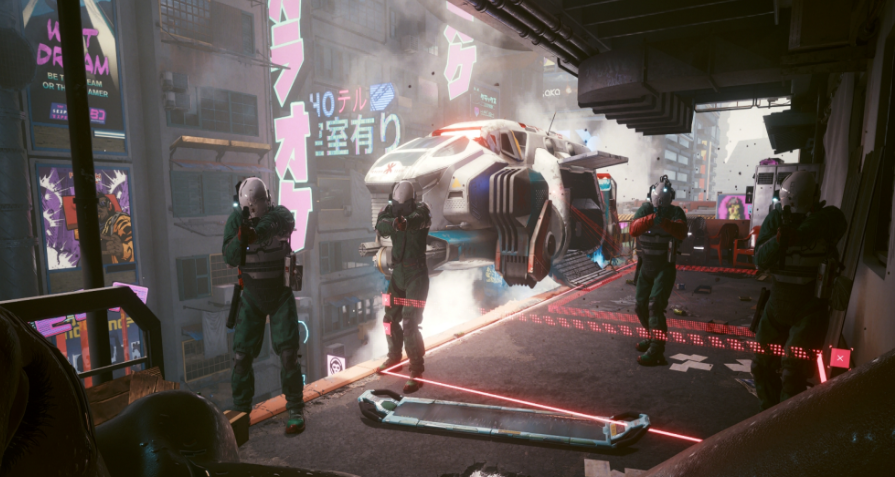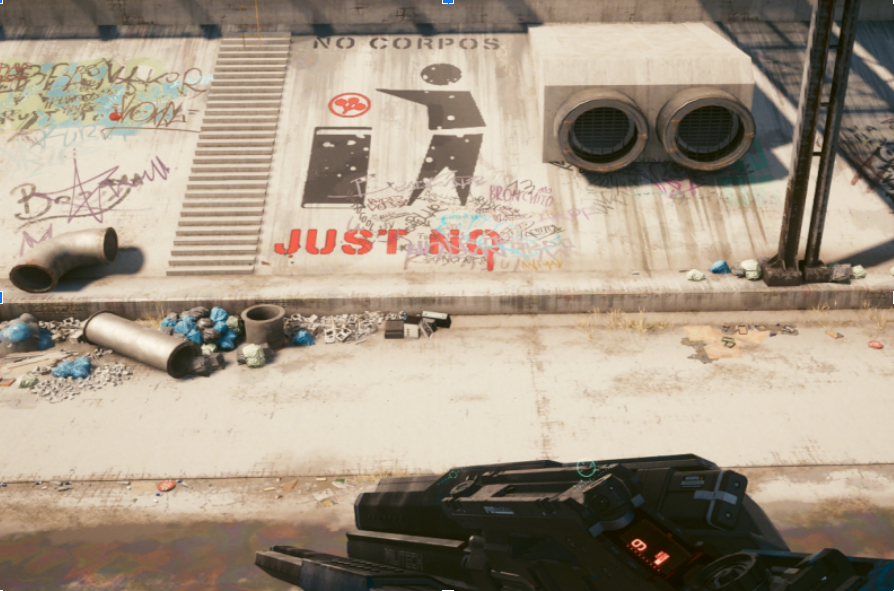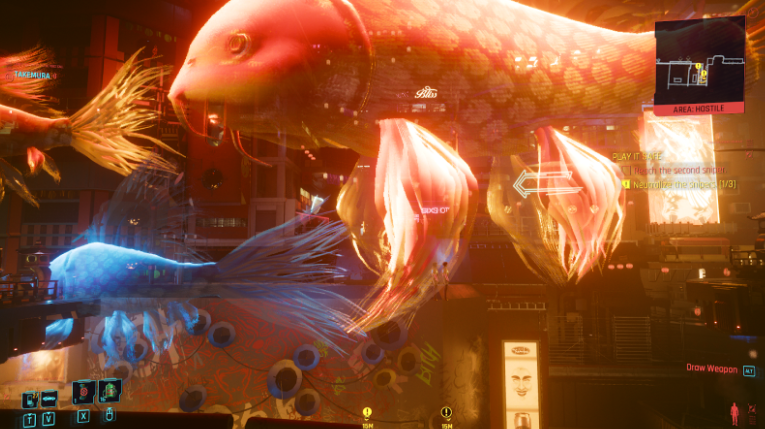Originally published on The Commoner, 30 June 2023. Shared using Creative Commons license. Feel free to support The Commoner via their Patreon here.
While this review of Cyberpunk 2077 will include some spoilers about the start of the game, it will exclude much of the later plot, especially the ending(s). Still, I will examine some parallels between the game and the real world.
Cyberpunk 2077 (2020), produced by the Polish company CD Projekt Red (with a market value of over $3 billion), is an enjoyable and incisive role-playing game (RPG) set in a deeply dystopian future. As its title suggests, the game blends such classic films as Blade Runner, Terminator, and The Matrix with video games like Deus Ex, Max Payne, and Grand Theft Auto. Its sequel, Phantom Liberty (2023), is highly-anticipated. Stunningly, with a budget of over $300 million, Cyberpunk is the most expensive game ever made. Indeed, the game’s photorealistic graphics themselves require the latest hardware, which is often costly, and usually environmentally destructive. Unlike newer games like Terra Nil (2023) that promote “climate positivity” and meditativeness in the face of global warming, Cyberpunk is a satirical odyssey depicting virtual class struggle in capitalist hellscapes. For this reason, as Thomas Wilson Jardine warns in his review of the game, its players run the risk of undergoing interpassivity, or the sublimated experience of revolutionary struggle, in place of actually organising for liberation.
Thematically, Cyberpunk has some crossover not only with Tonight We Riot (2020)—a revolutionary street-fighting game developed by Means TV—but also with ‘Duke Smoochem’ (2022), a surrealistic and irreverent fan-produced modification (or “mod”) of the PC game Duke Nukem 3D (1996). ‘Duke Smoochem’ is set in the present-day UK, dominated by the Conservative Party and stricken by COVID-19. Developer Dan Douglas explains: ‘I see Duke Smoochem as both a documentation of, and rebellion against, an increasingly absurd country, packaged as nostalgia.’ Indeed, it riffs on the satirical violence of ‘Thatcher’s Techbase,’ a Doom (1993) mod based on the premise of fighting off the late Conservative Prime Minister Margaret Thatcher’s resurrected demon. Yet, in contrast to the tones of ‘Duke Smoochem’ or ‘Thatcher’s Techbase,’ which are ‘silly and slapstick,’ Cyberpunk is more serious and grim-dark. That being said, these games function as ‘powerful piece[s] of protest art.’
Cyberpunk’s Anti-Capitalist Odyssey
Cyberpunk is set five decades from now in Night City, which is located somewhere in northern California. In this ultraviolent, hyper-capitalist metropolis, everything is for sale, the Night City Police Department (NCPD) is privatised, and the weapon-manufacturing conglomerates Arasaka and Militech compete for market dominance.
If players choose their protagonist ‘V’ to be a ‘corpo’ character, they will start in a prologue as a mid-ranking employee in Arasaka’s counter-intelligence division. During this sequence, one almost immediately encounters the company’s overpowering visual propaganda, aimed at instilling pride at its having supposedly ‘prevent[ed] mass riots in San Francisco’ in 2071 and ‘secure[d]’ a corporate summit in Jakarta in 2076. Meanwhile, the player’s interface monitors productivity alongside fluctuations in the stock market in real time. Just after one’s psychopathic boss impulsively assassinates several board members of the European Space Council by remote control, V is sent on a dangerous mission to eliminate this boss’s superior in the Arasaka hierarchy.
If players choose to be a ‘nomad,’ V and their comrade Jackie Welles bribe border guards to smuggle contraband into Night City, provoking violent retaliation from corporate agents. As a ‘street kid,’ V is arrested by the NCPD while stealing a luxury car for a petty crime boss.
When the game properly begins, whatever class one chooses, V and Jackie rescue the moribund Sandra Dorsett, who had been captured, sedated, and placed on ice by the Scavenger gang (who notoriously exploit their victims for the latter’s cyber-implants). To aid Sandra, an aggressively militarised Trauma Team promptly arrives in a flying ambulance, with guns drawn (see below). In parallel, V soon confronts the sad fate of the sex worker, or ‘doll,’ Evelyn Parker, who is sold by her boss to a shady ‘ripperdoc’ known as Fingers, who then in turn sells her off to the Scavengers. Players can decide how to react to these disturbing revelations, whether by sparing such abusers, or avenging their victims.

As in Deus Ex and other cyberpunk-themed games, this RPG allows one to play at being a ‘red detective’ who uncovers the atrocities of capitalism. For instance, when reading one of the multitude of ‘shards’ of textual information that can be discovered from fallen enemies or hacked computers in Night City, V learns of an exchange between a Militech officer and his superior, whereby the former requests authorization to open fire on striking workers who are not ‘responding to orders.’ Along similar lines, to protect corporate interests, the NCPD’s arsenal includes not only officers and SWAT teams, but also cyborg sentinels and elite airborne ‘MaxTac’ squads. As rackets ‘struggl[ing] for as great a share as possible of the surplus value,’ gangs and megacorporations alike compete in Night City for territory, arms, resources, labour, and political power. In keeping with Gramscian theories of hegemony, media throughout the Night City environment reinforce conservative-authoritarian messages about the need to obey the authorities and dedicate oneself to work.
Although its main story line is constant, no matter whether one starts as a ‘corpo,’ ‘nomad,’ or ‘street kid,’ Cyberpunk 2077 still allows for some variety in gaming experience. As with other RPG’s, players can choose to focus on physical strength and skills with weapons of different kinds, stealth and reflexes, hacking abilities, ‘coolness,’ or some combination of these attributes. They can also upgrade themselves, craft arms, and install different augmentations as they gain experience.
Besides its stunning graphics, the most unique aspect of Cyberpunk is its plot, which features physical and mental illness; the horrors of capitalist oppression, war trauma, and medical experimentation; and femicide, suicide, and mortality. That being said, these grave themes can be seen as variations on established cyberpunk media models, or as deepening and expanding the same. Either way, the in-game chance of pursuing a virtual heterosexual relationship (as a cis-male V) with the desert nomad Panam Palmer, and the recurrent motif of the “damsel in distress,” may re-entrench heteronormative and patriarchal values. Panam, after all, is reminiscent of Lara Croft, the heroine from the Tomb Raider games and films, who is known worldwide among “gamer bros” as a sex symbol.
Still, several LGBTQ+ cybersexual experiences are possible in the game. Among others, players have the choice to erotically proposition both male and female ‘dolls’; build a romance (as a cis-female V) with the hacker Judy Alvarez; and/or bond homosocially (as a cis-male V) with Johnny Silverhand, who is an anarchistic conscience and mentor played by Keanu Reeves. Moreover, this bond with Johnny may take on genderqueer and trans* dimensions, if one chooses a cis-female avatar at the outset. Arguably, this inclusion of possibilities for virtual, LGBTQ-inclusive sex-positivity is unique, among RPG’s, to Cyberpunk 2077. Still, this is not to downplay or ignore the transphobic messaging from Cyberpunk’s social media team, or the game’s trans-exclusive tying of gender to a binary choice on voice within the character creator, much less the casually white-supremacist in-game depiction of the Haitian street-gang known as the “Voodoo Boys.”

That being said, V’s relationship with Johnny—a former rock-star with the ‘Samurai’ band, trenchant critic of ‘corpos,’ and notorious insurrectionist—is intriguing. Silverhand is a brotherly figure who encourages V to think and act evermore boldly and radically. He inspires V to join in a ‘people’s war’ on the system. If players choose a cis-male avatar, these intimate political ties can take on homoerotic dimensions reminiscent of the comrade-love between a Samurai and his page, known as kosho. In parallel, while associating with Panam, V can also assist her collective, the Aldecaldo Nomads—who live outside Night City in a desert settlement powered by solar panels and windmills—in defending their autonomy against gangs and corporations alike.
Ultimately, the game’s main storyline can end in many different ways. While I will not spoil these endings here, to Thomas Wilson Jardine’s point, some certainly are post-modern and nihilistic. After all, before Cyberpunk even starts, players see a disclaimer from its creators, who clarify that they do not ‘endorse, condone, or encourage any of the viewpoints’ they’ve inserted into the game—a compelling and highly aesthetic journey into the “grim-dark” dimensions of capitalist hells!
Real-World Parallels
Regardless of CD Projekt Red’s disclaimer, Cyberpunk is a form of speculative fiction, akin to “cli-fi,” that projects existing infernal trends into the near future. It is a ‘second world to our ‘prime world’: a stark warning about the combination of ‘hyper-concentrated power and wealth,’ together with advanced technologies, such as artificial intelligence and futuristic weapons. The game ceaselessly illustrates the dangers of corporate domination resulting from monopoly capitalism, echoing the “privatised imperialism” advanced historically by the English Royal African Company and East India Company.
The horrors of capitalism are reflected in Cyberpunk in the violent competition between Arasaka and Militech, the privatised police force, and in workers having their brains scanned for what George Orwell called ‘thought crimes’—when they are not shot down for demanding their rights. As with other examples of dystopian sci-fi, Cyberpunk foreshadows some of the more frightening possible consequences of the adoption of so-called “brain interface devices.” It thus anticipates how the U.S. Federal Drug Administration just greenlighted Neuralink—a company owned by Elon Musk—to begin clinical trials for brain implants on humans.
At the same time, Cyberpunk dialectically promotes the heroism of proletarian rebellion and insurrection. The Aldecaldo nomads symbolise exilic autonomy from the system of exploitation, in an echo of the Zapatistas and the Rojava Revolution. While V can choose to fight against gangs and corporations alike with a view to opportunistically wresting social control from them—as is preached by Marxism—players can also aim to take virtual direct action against capitalist and bureaucratic domination, in line with anarchist principles.

Conclusion
So does Cyberpunk 2077 promote interpassivity, the phenomenon whereby a ‘piece of media performs our anti-capitalism for us’? That is a very real possibility. Yet, another possibility is that engaging with media about dystopian futures like Cyberpunk may not only nourish the radical imagination, but also encourage revolt. Along these lines, it is significant that, within a sector notorious for burning out developers—including in the very making of Cyberpunk itself—video-game workers have begun organising the industry’s first unions.
In terms of proving or disproving Wilson Jardine’s hypothesis, one way forward might be to perform social-research studies into the game’s effects on some of its players’ attitudes toward capitalism on the one hand, and any organising efforts they might have been involved with before, during, and/or after playing it, on the other. Such a model could also be applied to other games, books, TV shows, and films. For instance, there might be a comparative political study of players of Cyberpunk, Tonight We Riot, Deus Ex, and ‘Duke Smoochem.’ Another possibility would be to compare attitudes toward capitalism and commitment to organising projects among players of these violent games, versus those of more meditative, peaceful games, like Terra Nil. Some things to think about, Samurai!


